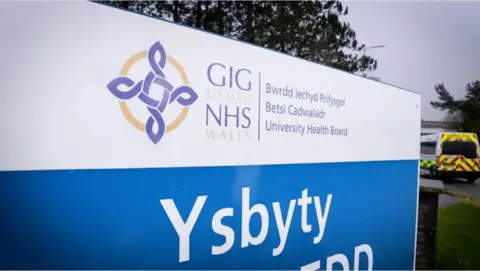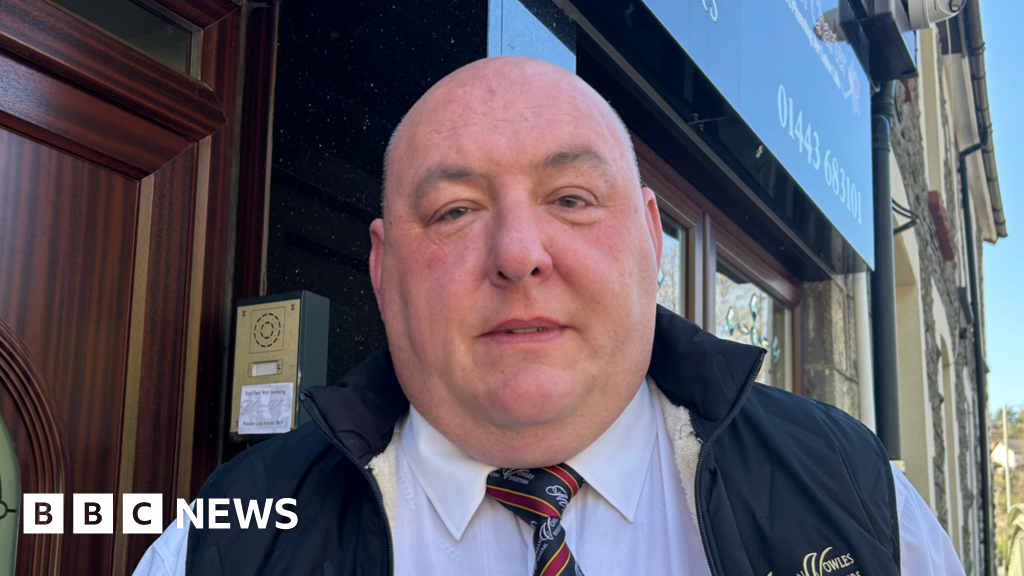
 BBC
BBC
Multiple failings led to a patient with Crohn's disease having a hysterectomy without giving informed consent, an ombudsman has found.
The woman, in her early 40s, said it has left her feeling like a "shadow" of her former self, as the procedure means she will not be able to have children.
Complaints were made by the patient, who is known as Ms A and is from north Wales, against Betsi Cadwaladr University Health Board, Liverpool University Hospitals NHS Foundation Trust and Liverpool Women's NHS Foundation Trust.
Carol Shillabeer, CEO of Betsi Cadwaladr University Health Board, apologised for the patient's "poor experience".
Over the course of three years, the Public Service Ombudsman for Wales said there had been "serious failings" that had caused the patient a "significant injustice".
The ombudsman, Michelle Morris, has called for a review to be carried out by Betsi Cadwaladr, which commissioned the care, Liverpool University Hospitals NHS Foundation Trust and Liverpool Women's NHS Foundation, which carried out the treatment.
Care for Ms A began in 2016 when, following a history of chronic inflammatory bowel disease (Crohn's disease), she had her large bowel removed at Ysbyty Glan Clwyd.
She was then referred to Liverpool University Hospital for further treatment in 2019.
In 2022, following three years of various tests and treatments, Ms A, who has no children, underwent further surgery at Liverpool Women's Hospital.
During this, a total hysterectomy was performed - a procedure where the womb is removed resulting in the inability to become pregnant.
According to Ms A, it was not until the morning of the surgery that she was made aware that a hysterectomy may be performed as part of the procedure.
The ombudsman found Ms A had not given informed consent for the extensive surgery, which she described as a "serious failing".
"Patients need to have proper time to understand the procedure and its possible consequences and the concern I have following is that she really didn't have those conversations before she was asked to sign a consent form, you know, literally at the last minute before she went into surgery," she said.
"She should have been warned that it was possible that during the surgery they would have to perform a full hysterectomy, and that's obviously a very serious possible consequence.
"In the end it did happen, so that's a serious failing on the part of that English health trust.
"The impact on Ms A both physically and psychologically has been significant. Ms A has been left devastated as she wanted to have children, and she grieves the loss of that opportunity."
As part of her evidence given to the ombudsman, Ms A said the treatment had left her feeling "a shadow" of her former self.
She added she now "avoids people" for fear of "bursting into tears" when they ask her about her health.
The ombudsman's report also raised concerns over the way in which Betsi Cadwaladr health board had monitored the care Ms A was receiving in England after staff had commissioned it.
"This lady is a patient of theirs (Betsi Cadwaladr health board). She's a resident in their area, and they are responsible for her health care," the ombudsman added.
"They don't divest themselves of that responsibility when they refer a patient to another trust, as happened in this case."
Marianne Radcliffe is chief executive of Crohn's and Colitis UK, a charity which supports people diagnosed with these diseases.
She said they hear regularly from women whose pain is "minimised or dismissed".
"It's awful to hear about Ms A's experience and the repeated failings in her care," she said.
"Many women living with Crohn's and Colitis have concerns about the impact of the conditions on their ability to have a family.
"This awful case highlights the importance of services and specialities working together.
"It is only by listening to women and remembering we are all more than a collection of symptoms that everyone will get the care they deserve."
Dr Jim Gardner, group chief medical officer for NHS University Hospitals of Liverpool Group, which runs the Royal Liverpool University Hospital and Liverpool Women's Hospital, said: "On behalf of NHS University Hospitals of Liverpool Group, I apologise for the failings identified in the report and I acknowledge the profound effects they have had, and continue to have, on the patient and her family.
"This was a very complex case involving multiple clinicians and departments across several hospitals.
"We have already made improvements, and we will ensure that the lessons learned from this are shared with our clinical teams to prevent something like this happening again."
Carol Shillabeer, CEO of Betsi Cadwaladr University Health Board, said it had already made improvements and will learn from this case.
"It is essential for the health of our population, we work with other health boards and trusts," she said.
"It is clear we need to improve our oversight arrangements for these commissioned services and we fully accept the Ombudsman's findings."

 1 week ago
8
1 week ago
8









